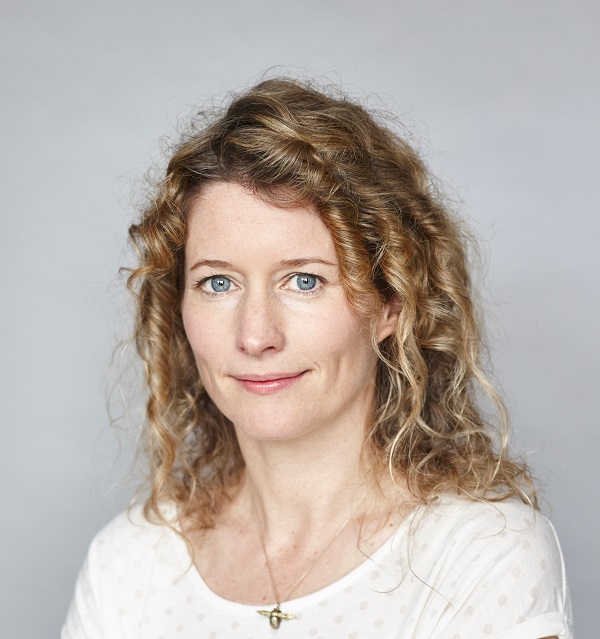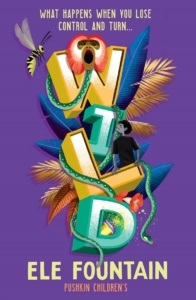
This article is in the Featured Author and Interviews Categories
Wild Adventures: an interview with Ele Fountain
Michelle Pauli talks to the author of Boy 87 about her new environmental adventure story.
When Jack’s mother suggests they take a holiday together, he’s thinking swimming pool, wifi and surfing. Instead, he finds himself deep in a tropical rainforest with her and her local friends, fighting for survival as they try to capture evidence against gun-toting loggers whose crimes endanger the very existence of the area’s indigenous peoples. It’s quite a trip.
 But although, like all of Ele Fountain’s books, Wild has a contemporary, news-based theme as its background, at the heart of the story is not an ‘issue’ but a character – in this case an angry, grieving and desperately hurting boy.
But although, like all of Ele Fountain’s books, Wild has a contemporary, news-based theme as its background, at the heart of the story is not an ‘issue’ but a character – in this case an angry, grieving and desperately hurting boy.
When we meet Jack he’s numbly going through the motions of his life after the loss of his father three months previously. Feeling unconnected from his mother, who was always busy with her work as an environmental anthropologist while his dad was there for him every day, Jack withdraws, a creeping sense of nihilism setting in. He veers towards the wrong path at his secondary school, moving from his old, familiar friends with their football games and pizza to a new gang that’s into bunking off school, shoplifting and vandalism. But when he reluctantly agrees to go on his mum’s ‘work trip’, he finds himself shaken to his core – physically and emotionally.
This combination of big background issue and strong foreground character started with Fountain’s debut, Boy 87, about a refugee child, and has continued to the more recent Melt, set in a remote Arctic village with a backdrop of environmental catastrophe, and Fake, about the impact of technology.
‘I like to make a connection between news stories and what’s happening in children’s lives, because these big news stories they’re hearing about can feel quite abstract,’ Fountain says. ‘So I try to create a story that will immerse them, give it context and make it real for them. If you can do that, then that deeper sense of understanding and greater knowledge of the issue can help to reassure them.’
‘My motivation for writing stories is to explore things I care deeply about. That’s often my starting point. But my books are very character led. So after I’ve decided what I want to be at the heart of my story, I immediately start thinking about who’s going to be in that story. The characters are really my way of expressing the subject I care about and giving those topics a more solid form.’
And Jack is a glorious character. While the journey through the rainforest is undoubtedly an exhilarating page-turning adventure, it is Jack’s inner journey that is the true heart of the novel. As the stakes increase and he faces a life and death situation and the prospect of losing his mother as well as his father, we see him gradually move from an angry, isolated boy unable to speak of his deep pain to a slow opening up, along with a recognition of the difference his own bravery can make, both personally and politically.
For Fountain, the different ways individuals – and cultures – deal with grief was instructive. She lived in Addis Ababa, Ethiopia for three years and points to the more collective and community-focused attitudes towards death and grieving she witnessed there.
‘When a death was announced, members of the community – family, relatives, neighbours – would descend on the household, there’d be tents erected, even in the road. People would come over for two or three days to grieve really openly together. In our culture, grief is often something that’s not discussed openly and people who’ve experienced grief can feel quite lonely. And, of course, everybody feels something different. That’s what I wanted to show, through Jack’s experiences, that there is no one feeling and there’s no right way to experience grief and instead we muddle through it together.’
Fountain’s strong character-led approach helps prevent her stories becoming too weighed down with the issues she explores but it is also, for her, a way to ensure she is writing about cultures other than her own in a respectful way. It’s a complex, sometimes controversial, area that Fountain is acutely aware of.
‘As a storyteller you must do your research and show respect,’ Fountain says. ‘Before I start writing, I research as much as I can quite intensely. And then I try to push it to the back of my mind when I write the character so it’s all there in my head but not coming out as a list of facts. I feel that it’s really important, when you’re writing about other cultures and other places, to respect them by doing thorough research and making sure all your facts are correct, whether you use them or not.’
For Wild she drew on her own visits to rainforests in Costa Rica and Malaysia but also delved into resources, from news reports, books and documentaries to weather reports and recordings of birdsong. It makes for an incredibly vivid, sense-assailing read – the reader is fully there in the sticky humidity of the rainforest surrounded by the cacophony of insect sounds and bird calls – not to mention the roars of belching howler monkeys or the excruciating pain of a bullet ant bite.
Unusually, perhaps, while the rainforest in Wild is clearly based on a real place – and there are lots of clues eagle-eyed young readers will pick up on if they want to identify the country and region – Fountain never names it. It’s a quirk throughout all her books and ties in with her very spare style of writing and habit of leaving things that can be, unsaid.
‘I have a very specific way that I like to write. I like to store everything in my head. And then I like to be very pared back, very reserved in what I put on the page,’ she explains. ‘It means there’s more scope for the reader’s imagination and to make it easier for them to relate to something that’s happened to them personally, or a story they’ve read about. There’s a bit of room to manoeuvre with more space to think and wonder.’
Fountain acknowledges the influence in her style of writing of her many years of editing children’s fiction (as well as a love for the work of Cormac McCarthy) but despite being steeped in the world of children’s books for so long, she nevertheless found the experience of writing her first novel nerve-racking. Holed up in Ethiopia with a four-month-old baby and a toddler, thanks to a job opportunity offered to her husband, she wrote Boy 87 in secret for fear that she wouldn’t finish it, or it would be terrible. When she submitted it, she did so under a pen name and fake email address ‘because I knew everyone in the publishing world that I’d be sending it to. I thought, well, if nobody likes it when we move back, no shame. And there was also a sense of pride, I felt that if somebody does like it, I want it to be for the for the writing.’
It went on to be shortlisted for the Waterstones children’s book prize, nominated for the Carnegie medal and winner of a number of regional book awards. And Fountain is now at work on her sixth novel, which she promises will be ‘quite stormy as there’s a female protagonist who’s also quite stormy. And there are oceans and sea and storms…’ In the meantime, students at the University of Reading will soon be able to make the most of her expertise and experience when she takes up post as a Royal Literary Fellow under the Royal Literary Fund Fellowship scheme, helping students develop their writing.
Michelle Pauli is a freelance writer and editor specialising in books and education. She created and edited the Guardian children’s books site.
Wild is published by Pushkin Children’s Books, 978-1782693840, £6.99 pbk.




